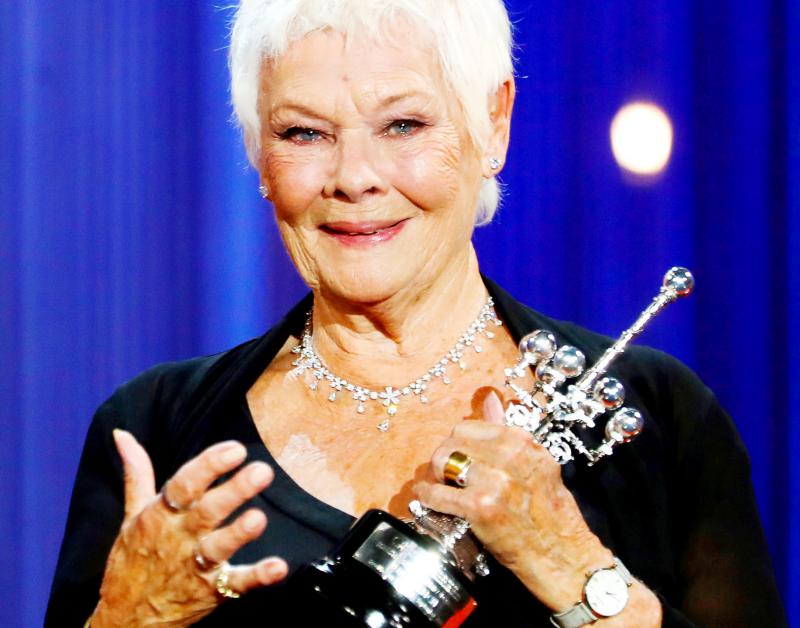You can’t call Judi Dench lazy when it comes to contributing to society, but she’s been particularly dedicated to boosting morale of late. Who knows, perhaps she felt pressured to make up for her turn in the unhinged Cats film, where her feline character horrified viewers by appearing to wear a coat made of its own fur.
Dench has provided vital comic relief during this time of crisis, predominantly with silly social media clips — a Twitter video of her wearing a novelty dog hat with pop-up ears in which she instructs us to “keep laughing” racked up 5.4 million views. Now she has supplied a far meatier pick-me-up by becoming, at 85, British Vogue’s oldest cover star.
On the front page of the magazine’s June issue, the Oscar-winner rocks a floral Dolce & Gabbana coat. But her outfit is far from the most striking thing about the shot. Instead, what immediately hits you are her jaunty pixie haircut and sparkling blue eyes. And yes, her wrinkled skin doesn’t go unnoticed, either — unsurprisingly, given that fashion magazines, like the rest of society, aren’t exactly known for celebrating getting older.

Photo: EPA-EFE
There are several heartening messages to take from the cover. First off, could it be that the age-phobic fashion world has finally realized that women don’t morph into unsightly crones the moment they hit 40? (And that readers won’t desert magazines when they choose to showcase them.)
Admittedly, Dench is far from an everywoman. Her megawatt star power means she can, to an extent, escape the prejudices usually directed at older people. But seeing as publisher CondeNast says the average Vogue reader is 39 for print and 44 for online, there’s a chance that this issue will enable readers to feel more represented age-wise. In turn, this could encourage the magazine to feature more older stars in the future.
But the cover is also cheering for a bazillion more reasons. At 85, Dench is in one of the highest risk groups for Covid-19; as her issue hits the newsstands, talk continues of an extended lockdown for the over-70s . In other words, we’re all too aware of the potential physical consequences of getting older at present. In this context, shots of her grinning mischievously feel defiant. A bit like Captain Tom Moore , except in silk. It’s for this same reason that her lighthearted social media videos have been such big hits. (Along with the dog hat offering, Dench did a TikTok dance with her grandson and went viral after teaming up with Gyles Brandreth for a rendition of The Owl and the Pussy-cat.)

Photo: EPA-EFE
Moreover, while the interview likens Dench to a “cultural tea cosy,” the conversation shows she’s much sharper than that. Take her pleasingly blunt response to her outfit in Cats. She describes her cloak as: “Like five foxes fucking on my back.”
Society has a tendency to patronize older people by pretending they are universally benign. Aside from giving a glimpse into how she operates on set, Dench’s confession that she can “be very difficult if somebody takes me for granted” hints that, well, don’t try that attitude with her.
Besides, while we continue to fetishize youth — just think of the tributes to how the BBC’s Normal People depicts the intensity of being young — a “pin sharp” depiction, went a recent Guardian editorial, of “the unforgettable intensity of first love and lust — Dench reminds us that there’s plenty of inspiration and vivacity to be found among the senior generation, too.
The psychotherapist Esther Perel recently spoke in a Financial Times podcast about how grandparents discussing difficult periods in their lives with younger relatives may be a way of passing resilience down the generations. I was reminded of this while watching the video that runs with Dench’s interview online, in which younger stars grill her for professional advice. Yes, she’s largely discussing acting rather than anything darker, but it still confirms that with age comes wisdom.
Age is not just a number; Dench is blunt about the physical challenges it brings.
“It’s terrible to be so dependent on people,” she says of having to give up driving. Even so, she’s fiercely resistant to the expectations that come with getting older. Take her attitude to retirement, for instance.
“Rage, rage against the dying of the light,” is how she sums it up, quoting Dylan Thomas.
All in all, you’re left thinking that while you can’t fight ageing’s physical reality, it is possible to push back against the prejudice that accompanies it.
Indeed, Dench’s cover will inevitably be branded age-defying, but it’s more accurate to say it defies our expectations of what getting older involves. Both her Vogue and social media stardom prove that vitality exists far beyond youth, and that it’s frankly ludicrous that society sidelines older women, given their style, wit and energy.
Honestly, Dench has been so busy imparting all sorts of key lessons of late, I’d suggest she give herself a break and retire. But, of course, she’d never agree to that.

April 28 to May 4 During the Japanese colonial era, a city’s “first” high school typically served Japanese students, while Taiwanese attended the “second” high school. Only in Taichung was this reversed. That’s because when Taichung First High School opened its doors on May 1, 1915 to serve Taiwanese students who were previously barred from secondary education, it was the only high school in town. Former principal Hideo Azukisawa threatened to quit when the government in 1922 attempted to transfer the “first” designation to a new local high school for Japanese students, leading to this unusual situation. Prior to the Taichung First

The Ministry of Education last month proposed a nationwide ban on mobile devices in schools, aiming to curb concerns over student phone addiction. Under the revised regulation, which will take effect in August, teachers and schools will be required to collect mobile devices — including phones, laptops and wearables devices — for safekeeping during school hours, unless they are being used for educational purposes. For Chang Fong-ching (張鳳琴), the ban will have a positive impact. “It’s a good move,” says the professor in the department of

On April 17, Chinese Nationalist Party (KMT) Chairman Eric Chu (朱立倫) launched a bold campaign to revive and revitalize the KMT base by calling for an impromptu rally at the Taipei prosecutor’s offices to protest recent arrests of KMT recall campaigners over allegations of forgery and fraud involving signatures of dead voters. The protest had no time to apply for permits and was illegal, but that played into the sense of opposition grievance at alleged weaponization of the judiciary by the Democratic Progressive Party (DPP) to “annihilate” the opposition parties. Blamed for faltering recall campaigns and faced with a KMT chair

Article 2 of the Additional Articles of the Constitution of the Republic of China (中華民國憲法增修條文) stipulates that upon a vote of no confidence in the premier, the president can dissolve the legislature within 10 days. If the legislature is dissolved, a new legislative election must be held within 60 days, and the legislators’ terms will then be reckoned from that election. Two weeks ago Taipei Mayor Chiang Wan-an (蔣萬安) of the Chinese Nationalist Party (KMT) proposed that the legislature hold a vote of no confidence in the premier and dare the president to dissolve the legislature. The legislature is currently controlled